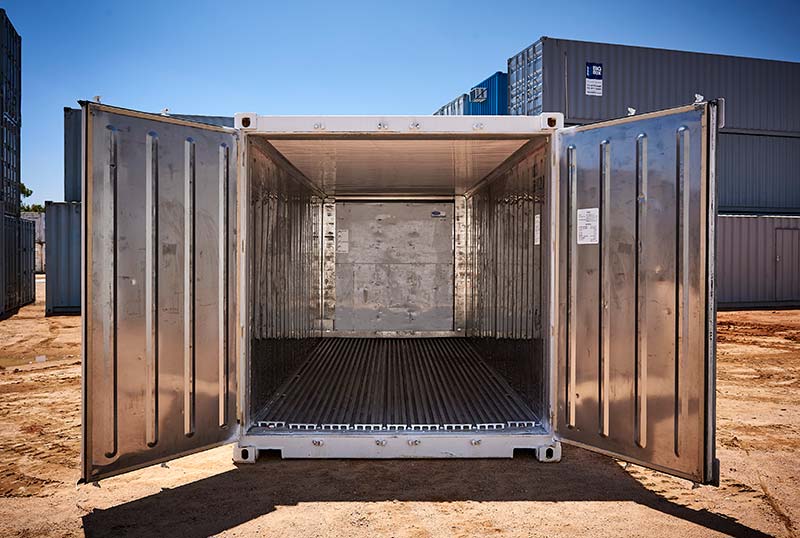Refrigerated containers are often used to transport food products such as fruits, vegetables, meat, fish, seafood, and dairy products. They are also ideal for transporting “fragile” non-food items such as flowers and pharmaceuticals. These containers can travel thousands of kilometres to transport cargo and maintain the required temperature throughout the journey, whether by sea or land. There are also many different brands of containers.
Isothermal vs Refrigeration, Are They the Same Thing?
It is important not to confuse these two types of containers. An insulated container is a refrigerated container that does not have a functioning cooling system. They are generally used to store equipment and plant protection products in agriculture, viticulture, beekeeping, etc. Isothermal containers use 7cm thick insulation on the four walls and ceiling, which is a feature of refrigerated containers, but the other features remain the same.
How Does a Refrigerated Container Work?
A refrigerated container is an air distribution unit with a motor located on one side, just like a conventional shipping container. The cold air is distributed from the ground through a special T-shaped floor, which has the advantage of creating a constant and uniform airflow throughout the load, and this is strong enough to guarantee a complete air exchange of goods. Typically, in a “classic” refrigerated container, the internal temperature can be controlled between -25°C and +25°C (+/-0.1°C). However, specific containers can maintain temperatures as low as -60°. If necessary, refrigerated containers are designed to maintain a favourable temperature of up to 25°C (77°F).
Important Notice
After loading, the generator (or engine) can be set to maintain the temperature required to transport the loaded cargo. Once the proper temperature is set, the container will self-regulate during transportation.
Even if the outside temperature suddenly rises or falls, the temperature inside will be maintained. However, please note that while refrigerated containers are excellent at maintaining cargo temperature, they cannot raise the temperature. Before loading, the cargo must be brought to a temperature suitable for transportation.
Some cargo needs to be transported in refrigerated, frozen or temperature-controlled conditions. Airflow requirements vary from shipment to shipment, and there is a “one-size-fits-all” approach to transporting refrigerated cargo.
For example, refrigerated cargo requires constant airflow to remove heat and gases, so the cartons used must be ventilated. In the case of refrigerated cargo, air must circulate the cargo, so there must be no gaps between the load and the walls or the cargo itself, and the cargo must be stored in one piece.
What Are the Advantages of Refrigerated Containers?
In the last decade, the market for refrigerated containers has exploded. Given the many advantages, this is not surprising.
-The self-contained refrigeration units do not need to be placed in a refrigerated warehouse upon arrival at their destination.
-Available in a variety of sizes (see below for details).
-Perfectly suitable for land, sea, and air transportation.
-It can also be divided into sections to create a space with different temperatures. This allows frozen and refrigerated products to be stored in the same container.
-It is durable and can operate in harsh environments.
-Can be transported in many carriers.
-Circulates fresh air to prevent premature aging of products and extend shelf life.
-Can be fully customized to meet specific needs.
To take full advantage of these benefits, it is essential to store refrigerated cargo properly. This is especially important in the case of refrigerated cargo. Some types of fruit, if not stored properly, may be rejected by the destination country due to the risk of pathogens.
If you’re looking for efficient refrigerated transport services for seafood, pastries, organic products, meat, poultry and more, you can contact the team at PK Logistics. They will implement a delivery method that guarantees your satisfaction.

